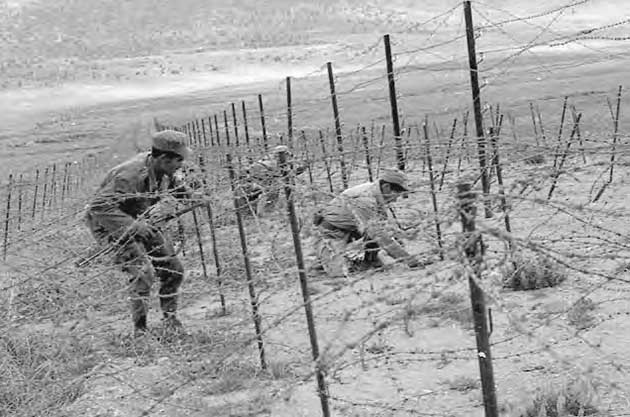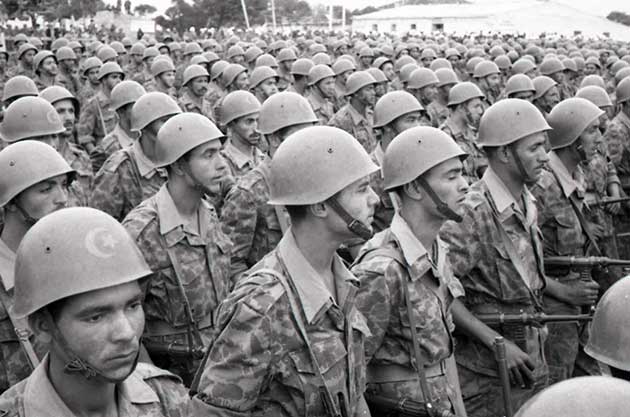History of the People's National Army
In the wake of Independence.. From the National Liberation Army to the People's National Army
The Tripoli program, a comprehensive political platform, adopted two months after the announcement of the cease-fire, in June 1962, stated in particular: “Algeria's accession to independence requires that a party of the ALN returns to civilian life and gives to the Party the frameworks and the other part constitutes the nucleus of the National Army”. This founding text also emphasized the need to organize a modern national army by developing the ALN. Thus, in July 1962, with the outcome of the war of national liberation, some 50,000 well-educated, highly disciplined soldiers and executives who formed the battalions of the ALN, constituted the Army of the People's Democratic Republic of Algeria. The latter had to both carry out its reconversion and face its new missions: “to safeguard territorial integrity within the borders now recognized by the international community, preserve public order, facilitate the return of refugees and assist the Algerian government in logistical and social operations…”. It was also a matter of filling the gaps left by the departure of a large number of its executives to other institutions, such as the administration and the Party.
Thus, during the first years of independence, it ensured the organization of food supplies and emergency aid to the population and, particularly, of actions intended to facilitate the return of more than 300,000 refugees who were in a health and moral bad situation. Likewise, after the departure of the French troops, the army began demining and defusing operations of the anti-personnel mines scattered along the edge of the Challe and Morice electrified lines.


In addition, a logistical organization was put in place to meet the structural and operational needs of the army. Thus, the departments of logistic, Material, Engineering and Health, Transport and Supply were firstly emerged. These directorates, which were quickly joined by those of Personnel, Air Force, Naval and Training, at the level of the Ministry of Defence, were about to form the backbone skeleton of the People's National Army. This first general structure bases will be consolidated with the structuring of the main departments, the establishment of an efficient organization, the opening of schools and training centres and the sending abroad of trainees to different weapons and services.
Thus was the creation of the command of the National Gendarmerie in August 1962, the transmission service in September 1962 and the installation of the Minister of Defence on 27th September 1962. Also, several schools have emerged, such as the School of Revolutionary Cadets in May 1963, the Military Combined Academy of Cherchell in June 1963, the School of Military Transport in March 1964, the School of the National Gendarmerie in Sidi Belabès on 27th March 1964, as well as the publication of the military judicial decree on 22nd August 1964. At the beginning of 1965 the National School of Aircraft Arm was created in Reghaia and during the same year the Tactical School of Military Equipment was opened followed by the Military Health School, the training centre in Boughar, then the Air Navigation school in Blida.
The missions of the People's National Army in the Algerian doctrine
After the independence, People's National Army action and missions were broadened to encompass building and reconstruction tasks, it was obvious that the contribution of PNA in this initiative was major, being the only organizing force of the country and for certain considerations dictated by the imperatives of the development of our nation, after a colonial era which lasted more than 130 years. Consequently, it was entrusted to the Army, by steps, several missions between 1963 and 1989, consisting in combining defence of the integrity of the territory and building of the country;


Thus, Until 23rd February 1989, date on which Algeria adopted a new constitution, inaugurating an era of political pluralism and leading the way to comprehensive reform and democratic transition, in this perspective, People's National Army withdrew from the political debate to devote itself exclusively to its missions of sovereignty and national unity defence in accordance with the article 24 of the 1989 constitution. These missions were confirmed by the article 25 of the constitution amended in 1996 revised in 2008.


And in the shadow of the transformations that Algeria has known and following the new constitutional order, People's National Army was demonstrating its political neutrality in the era of pluralism through its voluntary withdrawal from the FLN Central Committee. on the 4th April 1989, a directive was issued from Chief of Staff of PNA, relating to the new constitutional missions of PNA and the duties for its members mentioning that, as if to affirm its apolitical character, "although he is a citizen enjoying all his rights, any soldier cannot aspire to participate in political activity or against any political formation either inside or outside the military institutions”.
The Algerian Army welcomed the political reforms advent aiming to concretize the democratic process initiated by the new constitution. The army has contributed to this process by placing itself above partisan struggles and by ensuring the constitutional legitimacy to build a just and egalitarian society. Through this responsible attitude, People's National Army has complied with the constitution disposition while preserving its cohesion and the unity of its ranks.
The Tripoli program, a comprehensive political platform, adopted two months after the announcement of the cease-fire, in June 1962, stated in particular: “Algeria's accession to independence requires that a party of the ALN returns to civilian life and gives to the Party the frameworks and the other part constitutes the nucleus of the National Army”. This founding text also emphasized the need to organize a modern national army by developing the ALN. Thus, in July 1962, with the outcome of the war of national liberation, some 50,000 well-educated, highly disciplined soldiers and executives who formed the battalions of the ALN, constituted the Army of the People's Democratic Republic of Algeria. The latter had to both carry out its reconversion and face its new missions: “to safeguard territorial integrity within the borders now recognized by the international community, preserve public order, facilitate the return of refugees and assist the Algerian government in logistical and social operations…”. It was also a matter of filling the gaps left by the departure of a large number of its executives to other institutions, such as the administration and the Party.
Thus, during the first years of independence, it ensured the organization of food supplies and emergency aid to the population and, particularly, of actions intended to facilitate the return of more than 300,000 refugees who were in a health and moral bad situation. Likewise, after the departure of the French troops, the army began demining and defusing operations of the anti-personnel mines scattered along the edge of the Challe and Morice electrified lines.


In addition, a logistical organization was put in place to meet the structural and operational needs of the army. Thus, the departments of logistic, Material, Engineering and Health, Transport and Supply were firstly emerged. These directorates, which were quickly joined by those of Personnel, Air Force, Naval and Training, at the level of the Ministry of Defence, were about to form the backbone skeleton of the People's National Army. This first general structure bases will be consolidated with the structuring of the main departments, the establishment of an efficient organization, the opening of schools and training centres and the sending abroad of trainees to different weapons and services.
Thus was the creation of the command of the National Gendarmerie in August 1962, the transmission service in September 1962 and the installation of the Minister of Defence on 27th September 1962. Also, several schools have emerged, such as the School of Revolutionary Cadets in May 1963, the Military Combined Academy of Cherchell in June 1963, the School of Military Transport in March 1964, the School of the National Gendarmerie in Sidi Belabès on 27th March 1964, as well as the publication of the military judicial decree on 22nd August 1964. At the beginning of 1965 the National School of Aircraft Arm was created in Reghaia and during the same year the Tactical School of Military Equipment was opened followed by the Military Health School, the training centre in Boughar, then the Air Navigation school in Blida.
The missions of the People's National Army in the Algerian doctrine
After the independence, People's National Army action and missions were broadened to encompass building and reconstruction tasks, it was obvious that the contribution of PNA in this initiative was major, being the only organizing force of the country and for certain considerations dictated by the imperatives of the development of our nation, after a colonial era which lasted more than 130 years. Consequently, it was entrusted to the Army, by steps, several missions between 1963 and 1989, consisting in combining defence of the integrity of the territory and building of the country;
Subsequently, it devoted itself almost exclusively to its missions of defence and preservation of security, while retaining a certain availability to contribute to efforts of national interest. However, we cannot approach the present without evoking the past. A reminder of the institutional order of People's National Army was obvious.
Indeed, article 8 of the 1963 constitution grants People's National Army social, political and economic prerogatives in addition to its main mission, which is to defend the country.
Indeed, article 8 of the 1963 constitution grants People's National Army social, political and economic prerogatives in addition to its main mission, which is to defend the country.

This is how People's National Army affirms its participation in the reconstruction and building of the country and this through the constitution of 1976, in fact, the article 82 stipulates that: “People’s National Army, heir to the National Liberation Army and shield of the Revolution, has the permanent mission of safeguarding independence and national sovereignty. It is responsible for ensuring the defence of the country's unity and territorial integrity, as well as the protection of its air and land spaces, its territorial waters, its continental shelf and the exclusive economic zone. People's National Army, instrument of the Revolution, participates in the development of the country by building socialism”, and the article 83 of the same constitution;



The Algerian Army welcomed the political reforms advent aiming to concretize the democratic process initiated by the new constitution. The army has contributed to this process by placing itself above partisan struggles and by ensuring the constitutional legitimacy to build a just and egalitarian society. Through this responsible attitude, People's National Army has complied with the constitution disposition while preserving its cohesion and the unity of its ranks.



